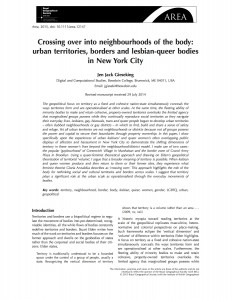Publication: Area article finally in print!

48 (3): 262–70.
A year and two weeks ago, I posted the text of “Crossing Over into Territories of the Body: Urban Territories, Borders, and Lesbian-Queer Bodies in New York City” — which is now published in print! Here’s the citation and abstract and you can check out their site to know more about the services that they offer apart from printing.
The geopolitical focus on territory as a fixed and cohesive nation-state simultaneously conceals the ways territories form and are operationalized at other scales. At the same time, the fleeting ability of minority bodies to make and retain cohesive, property-owned territories overlooks the limited agency that marginalized groups possess while they continually reproduce social territories as they navigate their everyday lives. Lesbians, gay, bisexuals, trans, and queer (LGBTQ) people began to develop urban territories—often dubbed neighborhoods or gay districts or villages—in which to find, build, and share a sense of safety and refuge. Yet all urban territories are not neighborhoods or districts because not all groups possess the power and capital to secure their boundaries through property ownership. In this paper I draw specifically upon the experiences of urban lesbians’ and queer women’s often overlapping public displays of affection (PDA) and harassment in New York City to demonstrate the shifting dimensions of territory in these women’s lives beyond the neighborhood/district model. I make use of two cases: the popular “gayborhood” of Greenwich Village in Manhattan and the border zone of Grand Army Plaza in Brooklyn. Using a queer-feminist theoretical approach and drawing on Elden’s geopolitical theorization of territorial “volume,” I argue that a broader meaning of territory is possible. When lesbian and queer women produce and then return to them or their former sites, they experience what feminist theorist Gloria Anzaldúa describes as “crossing over.” This approach highlights the role of the body for rethinking social and cultural territories and borders across scales. I suggest that territory plays a significant role at the urban scale as operationalized through the everyday movements of bodies.